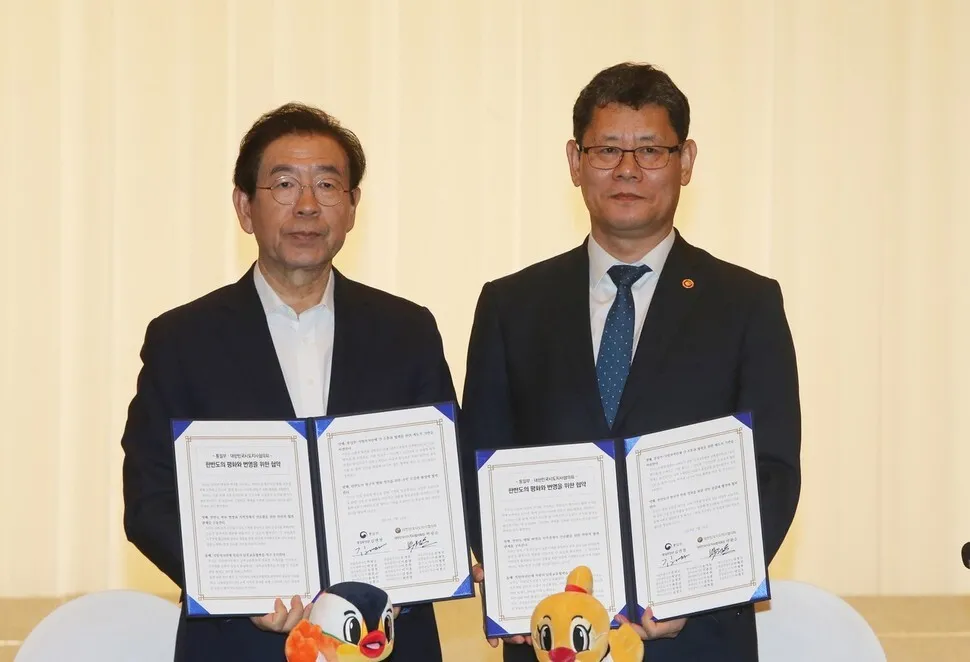hankyoreh
Links to other country sites 다른 나라 사이트 링크
S. Korea’s local governments can now provide humanitarian aid directly to N. Korea
Posted on : 2019-10-23 17:42 KST Modified on : 2019-10-23 17:42 KST
Unification Ministry revises regulations for humanitarian, inter-Korean projects

South Korean Unification Minister Kim Yeon-chul (right) and Seoul Mayor Park Won-soon pose for a commemorative photograph after signing a pledge to revise policies to allow local governments to send humanitarian aid directly to North Korea at the The Westin Chosun Busan hotel on July 24.
South Korea’s local governments now have the option of directly providing humanitarian aid to North Korea rather than working through NGOs.
South Korea’s Unification Ministry announced on Oct. 22 that it had revised rules about humanitarian aid and cooperation projects with North Korea to allow local government bodies to gain approval as operators of North Korean aid programs.
Prior to this, local governments haven’t been allowed to directly manage humanitarian aid programs for North Korea. As a result, they’ve had to work with NGOs that are accredited as North Korean aid providers and borrow the name of those NGOs when sending aid to the North or submitting applications to the Inter-Korean Cooperation Fund. That’s why Gyeonggi Province, for example, has been running North Korean aid programs under the name of the Korean Sharing Movement.
Since the Unification Ministry’s regulatory revision enables local governments to deal directly with the North, those local governments are expected to expand programs aimed at providing aid to the North or promoting cooperation and exchange there. But that has also prompted concerns that NGOs will have more trouble raising funds, leading to the curtailment of similar programs organized by the private sector.
This update of the rules follows the adoption of a pledge to devolve North Korean policy from the central government to local governments (called the Pact for Peace and Prosperity on the Korean Peninsula) on July 24. Signed by Unification Minister Kim Yeon-chul and Park Won-soon, mayor of Seoul and chair of the Governors Association of Korea, the pledge specified that local governments are legal agents in inter-Korean exchange and cooperation.
After Kim took office, the Unification Ministry released an authoritative legal interpretation stating that local government bodies can be legal agents in exchange and cooperation. In support of that interpretation, the Ministry cited Article 2 of the Exchange and Cooperation Act, which states that juridical persons (that is, non-human legal entities) can become actors of exchange and cooperation, and Article 3 of the Local Government Act, which states that local government bodies are juridical persons.
By Lee Je-hun, senior staff writer
Please direct comments or questions to [english@hani.co.kr]

광고
Editorial・opinion
![[Column] Imperial tyranny, Korean humiliation [Column] Imperial tyranny, Korean humiliation](https://flexible.img.hani.co.kr/flexible/normal/500/300/imgdb/original/2025/0912/7617576652278449.jpg) [Column] Imperial tyranny, Korean humiliation
[Column] Imperial tyranny, Korean humiliation![[Correspondent’s column] Cognitive dissonance in MAGA world [Correspondent’s column] Cognitive dissonance in MAGA world](https://flexible.img.hani.co.kr/flexible/normal/500/300/imgdb/original/2025/0912/3417576648512186.jpg) [Correspondent’s column] Cognitive dissonance in MAGA world
[Correspondent’s column] Cognitive dissonance in MAGA world- [Editorial] Korea, US need a ‘gentlemen’s agreement’ on what job creation entails
- [Column] Why MAGA has its eyes set on Korea
- [Column] Lee still has his work cut out for him after summit with Trump
- [Editorial] Is this any way for the US to treat an ally?
- [Column] Lee’s difficult task of striking a balance on Japan
- [Editorial] Multipolar era means Seoul must broaden its diplomacy
- [Column] North and South Korea are no longer pawns in US-China-Russia relations
- [Column] Who we fail when we oversimplify the ‘comfort women’ issue
Most viewed articles
- 1Seoul says US must fix its visa system if it wants Korea’s investments
- 2North Korea said to have exposed numerous US spies after botched 2019 SEAL mission
- 3[Column] Imperial tyranny, Korean humiliation
- 4Freed workers arrive in Korea, one week after ICE raid in Georgia
- 5Korea’s president says firms will be ‘very hesitant’ about investing in US after ICE raid
- 6[Correspondent’s column] Cognitive dissonance in MAGA world
- 7Son of ex-President Roh Tae-woo tapped to serve as ambassador to China
- 8MAGA’s traveling circus comes to Korea
- 9[Column] Why MAGA has its eyes set on Korea
- 10Lee says he won’t sign any tariff deal with US that doesn’t benefit Korea